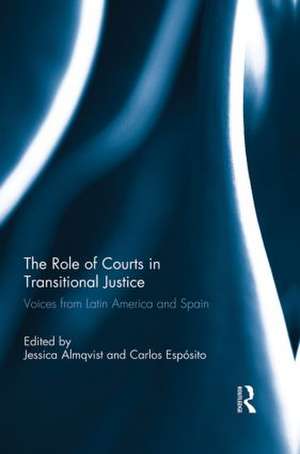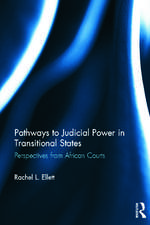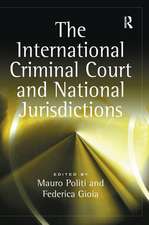The Role of Courts in Transitional Justice: Voices from Latin America and Spain
Editat de Jessica Almqvist, Carlos Espositoen Limba Engleză Paperback – 12 apr 2013
The Role of Courts in Transitional Justice is essential reading for practitioners, policy-makers and scholars engaged in the transitional justice processes or interested in judicial and legal perspectives on the role of courts, obstacles faced, and how they may be overcome. It is unique in its ambition to offer a comprehensive and systematic account of the Latin American and Spanish experience and in bringing the insights of renowned judges and experts in the field to the forefront of the discussion.
| Toate formatele și edițiile | Preț | Express |
|---|---|---|
| Paperback (1) | 493.12 lei 6-8 săpt. | |
| Taylor & Francis – 12 apr 2013 | 493.12 lei 6-8 săpt. | |
| Hardback (1) | 825.78 lei 6-8 săpt. | |
| Taylor & Francis – 25 noi 2011 | 825.78 lei 6-8 săpt. |
Preț: 493.12 lei
Nou
Puncte Express: 740
Preț estimativ în valută:
94.37€ • 102.47$ • 79.27£
94.37€ • 102.47$ • 79.27£
Carte tipărită la comandă
Livrare economică 22 aprilie-06 mai
Preluare comenzi: 021 569.72.76
Specificații
ISBN-13: 9780415870252
ISBN-10: 0415870259
Pagini: 336
Dimensiuni: 156 x 234 x 18 mm
Greutate: 0.54 kg
Ediția:1
Editura: Taylor & Francis
Colecția Routledge
Locul publicării:Oxford, United Kingdom
ISBN-10: 0415870259
Pagini: 336
Dimensiuni: 156 x 234 x 18 mm
Greutate: 0.54 kg
Ediția:1
Editura: Taylor & Francis
Colecția Routledge
Locul publicării:Oxford, United Kingdom
Public țintă
Postgraduate and UndergraduateCuprins
Acknowledgements, Authors’ Biographies, 1. Introduction Jessica Almqvist & Carlos Espósito, 2. Recollections of the International Adjudication of Cases of Massacres: Its Relevance for Transitional Justice and Beyond Antônio Augusto Cançado Trindade, 3. The Progressive Development of the International Law of Transitional Justice: The Role of the Inter-American System Felipe Gonzalez Morales, 4. The Possibility of Criminal Justice: The Argentinean Experience Ricardo Gil Lavedra, 5. Chilean Transitional Justice and the Legacy of the De Facto Regime Roberto Garretón, 6. Spain as an Example of Total Oblivion with Partial Rehabilitation Alicia Gil Gil, 7. The Challenges posed to the Recent Investigation of Crimes Committed during the Spanish Civil War and Francoism Javier Chinchón Álvarez, 8. Responding to Human Rights Violations Committed During the Internal Armed Conflict in Peru: The Limits and Advances of Peruvian Criminal Justice Yvan Montoya Vivanco, 9. Many Roads to Justice: Transnational Prosecutions and International Support for Criminal Investigations in Post-Conflict Guatemala Naomi Roht-Arriaza & Almudena Bernabeu,10. The Criminal Investigation and Its Relationship to Jurisdiction, Extradition, Cooperation and Criminal Policy Susan Kemp, 11. Colombia as a Sui Generis Case Alejandro Aponte, 12. Restoring Civic Confidence through Transitional Justice Paul Seils, 13. The International Criminal Court: Possible Contributions of the Rome Statute to Judicial Processes in Transitional Societies Elizabeth Odio Benito, 14. Conclusion Carlos Espósito & Jessica Almqvist
Descriere
This book examines the role of courts in times of transition. The book focuses on judicial experiences from the Iberoamerican region, in particular Argentina, Chile, Colombia, Spain and Guatemala, exploring the extent to which national courts have been able to shoulder the task of investigating and prosecuting grave crimes such as genocide, crimes against humanity and war crimes, committed in the context of a previous repressive rule or current conflict.
The volume contains contributions from judges, prosecutors, and scholarly experts in the region. It offers first-hand experiences and expert findings on crucial issues surrounding the role of the courts. The book also draws attention to the way in which regional and international courts have come to contribute to the initiation of national judicial processes, above all, through international standard-setting and pressure. It goes on to articulate a philosophical critique of the dominant understandings of transitional justice because it has not paid sufficient attention to criminal justice. In this context, the volume outlines an alternative conceptualisation that seems better equipped to both explain the recent developments towards the ‘judicialization’ of transitional justice politics while, at the same time, also insisting on the continued need for caution and critical reflection on the role of courts in times of transition.
The volume contains contributions from judges, prosecutors, and scholarly experts in the region. It offers first-hand experiences and expert findings on crucial issues surrounding the role of the courts. The book also draws attention to the way in which regional and international courts have come to contribute to the initiation of national judicial processes, above all, through international standard-setting and pressure. It goes on to articulate a philosophical critique of the dominant understandings of transitional justice because it has not paid sufficient attention to criminal justice. In this context, the volume outlines an alternative conceptualisation that seems better equipped to both explain the recent developments towards the ‘judicialization’ of transitional justice politics while, at the same time, also insisting on the continued need for caution and critical reflection on the role of courts in times of transition.


























